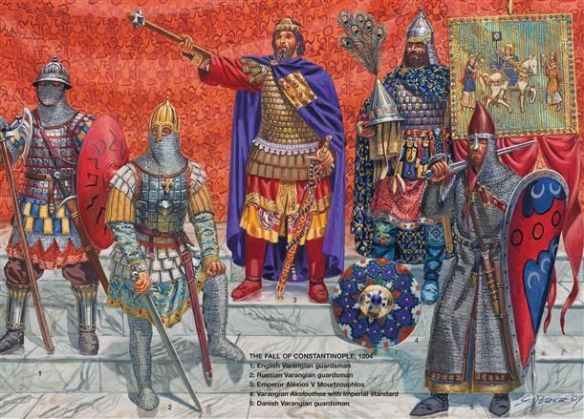
Pope Innocent III inaugurated the Fourth Crusade after Saladin’s empire began to disintegrate. Tragically, however, the crusading army of mostly French nobles was diverted to Constantinople to intervene in Byzantine politics. In 1204, the Christian crusaders stormed and sacked one of Christendom’s greatest cities. This description of the conquest of Constantinople is taken from a contemporary account by a participant in the struggle. Crusaders arriving at the land and sea walls of Constantinople, from a Venetian manuscript (ca. 1330) of La Conquete de Constantinople by Geoffrey of Villehardouin, who took part in the Fourth Crusade. When the Venetian force’s entry into the city was pushed back by the imperial bodyguard, they set fire to a number of buildings and burned a large section of an affluent suburb. It was a harbinger of worse destruction to come.
Geoffrey de Villehardouin, The Conquest of Constantinople
The moment the knights aboard the transports saw this happen, they landed, and raising their ladders against the wall, climbed to the top, and took four more towers. Then all the rest of the troops started to leap out of warships, galleys, and transports, helter-skelter, each as fast as he could. They broke down about three of the gates and entered the city. The horses were then taken out of the transports; the knights mounted and rode straight towards the place where the Emperor had his camp. He had his battalions drawn up in front of the tents; but as soon as his men saw the knights charging towards them on horseback, they retreated in disorder. The Emperor himself fled through the streets of the city to the castle of Bucoleon.
Then followed a scene of massacre and pillage: on every hand the Greeks [Byzantines] were cut down, their horses, palfreys [saddlehorses], mules, and other possessions snatched as booty. So great was the number of killed and wounded that no man could count them. A great part of the Greek nobles had fled towards the gate of Blachernae; but by this time it was past six o’clock, and our men had grown weary of fighting and slaughtering. The troops began to assemble in a great square inside Constantinople . . . [and] decided to settle down near the walls and towers they had already captured. . . .
That night passed, and the next day came. . . . Early that morning all the troops, knights and sergeants alike, armed themselves, and each man went to join his division. They left their quarters thinking to meet with stronger resistance than they had encountered the day before, since they did not know that the Emperor had fled during the night. But they found no one to oppose them.
The Marquis de Montferrat rode straight along the shore to the palace of Bucoleon. As soon as he arrived there the place was surrendered to him, on condition that the lives of all the people in it should be spared. Among these were very many ladies of the highest rank who had taken refuge there. . . . Words fail me when it comes to describing the treasures found in the palace, for there was such a store of precious things that one could not possibly count them. . . .
The rest of the army, scattered throughout the city, also gained much booty; so much, indeed, that no one could estimate its amount or its value. It included gold and silver, table-services and precious stones, satin and silk, mantles of squirrel fur, ermine and miniver, and every choicest thing to be found on this earth. Geoffrey de Villehardouin here declares that, to his knowledge, so much booty had never been gained in any city since the creation of the world.
Everyone took quarters where he pleased, and there was no lack of fine dwellings in that city. So the troops of the Crusaders and the Venetians were duly housed. They all rejoiced and gave thanks to our Lord for the honor and the victory He had granted them, so that those who had been poor now lived in wealth and luxury. Thus they celebrated Palm Sunday and the Easter Day following, with hearts full of joy for the benefits our Lord and Saviour had bestowed on them. And well might they praise Him; since the whole of their army numbered no more than twenty thousand men, and with His help they had conquered four hundred thousand, or more, and that in the greatest, most powerful, and most strongly fortified city in the world.